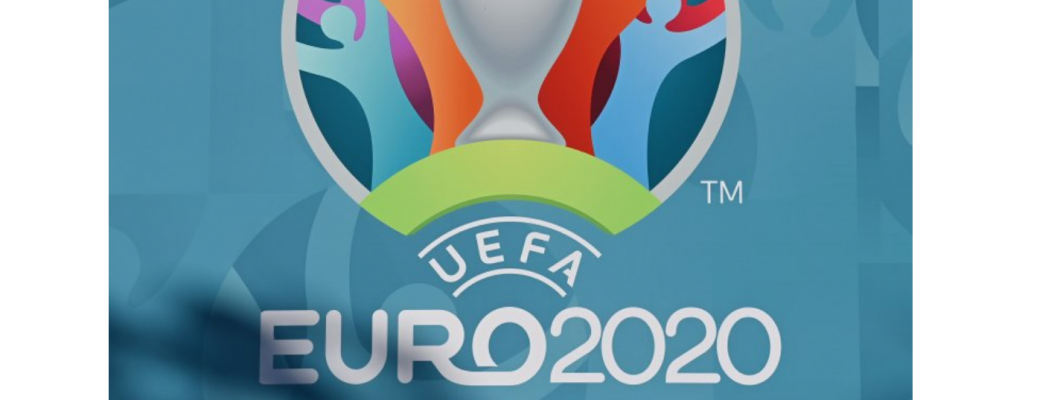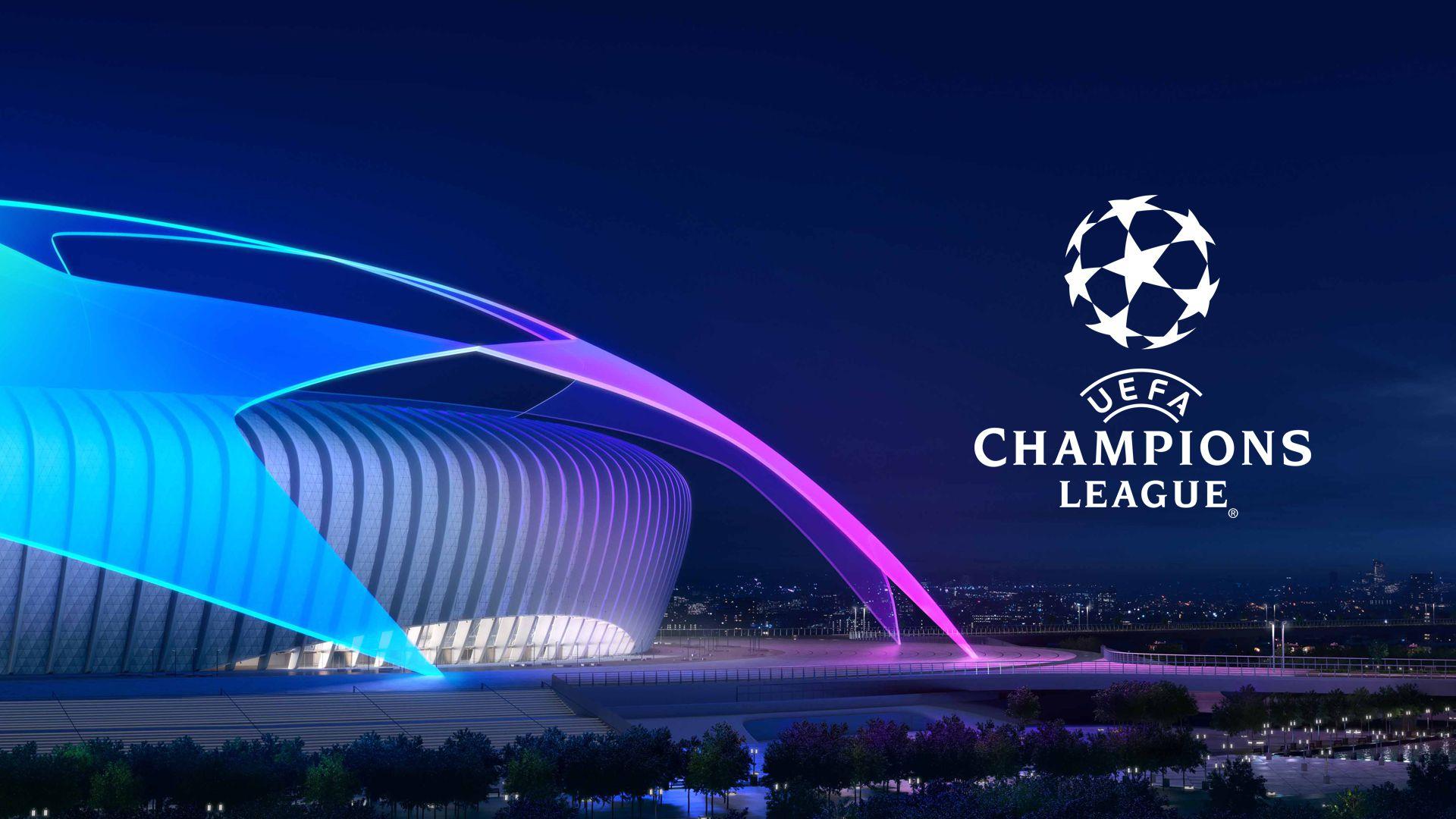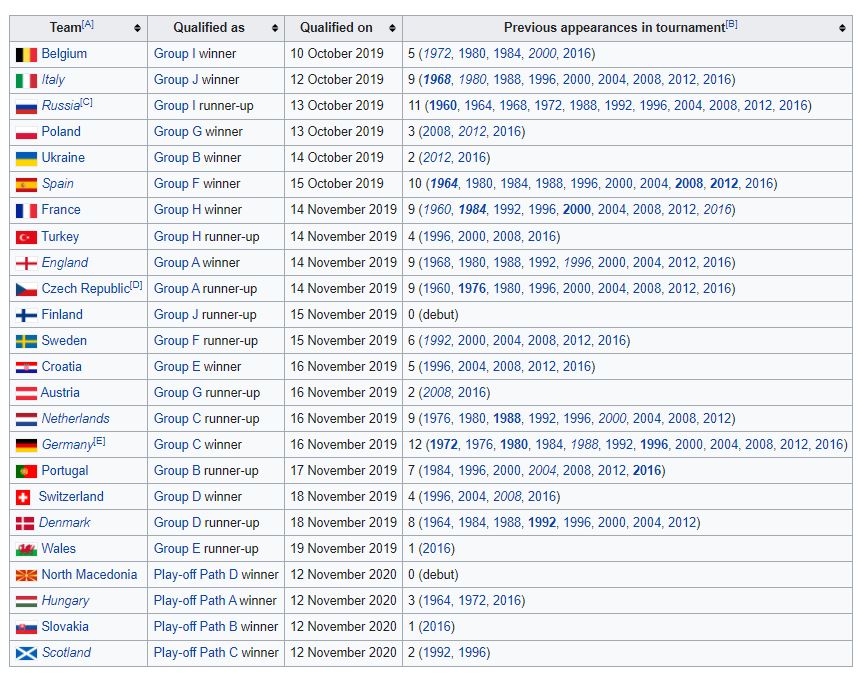
UEFA Euro 2020
The 2020 UEFA European Football Championship, commonly referred to as 2020 UEFA European Championship, UEFA Euro 2020, or simply Euro 2020, is the 16th UEFA European Championship, the quadrennial international men's football championship of Europe organised by the Union of European Football Associations (UEFA).[1]
The tournament, being held in 11 cities in 11 UEFA countries, was originally scheduled from 12 June to 12 July 2020, but was postponed due to the COVID-19 pandemic in Europe and rescheduled for 11 June to 11 July 2021.[2] It retains the name "UEFA Euro 2020".[3] Portugal are the defending champions, having won the 2016 competition in France, and the video assistant referee (VAR) system makes its debut at the European Championship in this tournament.[4]
UEFA President Michel Platini said in 2012 that the tournament was to be hosted in several nations as a "romantic" one-off event to celebrate the 60th "birthday" of the European Championship competition.[5] Having the largest capacity of any of the stadiums entered for the competition, Wembley Stadium in London is scheduled to host the semi-finals and final for the second time, having done so before at the 1996 tournament in the stadium's former incarnation. The Stadio Olimpico in Rome was chosen to host the opening game, involving Turkey and hosts Italy. Originally to be played at 13 venues, two hosts were later removed: Brussels in December 2017 due to the abandonment of building the Eurostadium,[6] and Dublin in April 2021 as there was no guarantee that spectators could attend. Spain also changed their host city from Bilbao to Seville to allow an audience at matches.[7]

Effects of the COVID-19 pandemic
Start of the pandemic and postponement
In early 2020, the COVID-19 pandemic in Europe triggered concerns regarding its potential impact on players, staff and visitors to the twelve host cities of the tournament.[26] At the UEFA Congress in early March, UEFA president Aleksander Čeferin said the organisation was confident that the situation could be dealt with, while general secretary Theodore Theodoridis stated that UEFA was maintaining contact with the World Health Organization and national governments regarding the coronavirus.[27] The impact on football grew later that month, as numerous domestic and UEFA competition matches began taking place behind closed doors. By 13 March 2020, upcoming UEFA competition fixtures were postponed, while major European leagues were suspended, including the Bundesliga, La Liga, Ligue 1, Premier League and Serie A.[28]
UEFA held a videoconference on 17 March 2020 with representatives of its 55 member associations, along with a FIFPro representative and the boards of the European Club Association and European Leagues, to discuss the response to the outbreak for domestic and European competitions, including Euro 2020.[29] At the meeting, UEFA announced that the tournament would be postponed to the following year, proposing that it take place from 11 June to 11 July 2021.[30] The postponement allowed for pressure to be reduced on the public services in affected countries, while also providing space in the calendar for domestic European leagues that had been suspended to complete their seasons.[2] On the following day, the Bureau of the FIFA Council approved the date change in the FIFA International Match Calendar. As a result, the expanded FIFA Club World Cup, due to take place in June and July 2021, was postponed.[31] On 23 April 2020, UEFA confirmed that the tournament would still be known as UEFA Euro 2020.[3][32]
Spectator plans and venue changes

In May 2020, Čeferin stated that in principle the tournament would take place in the twelve selected host cities. However, he did not rule out the possibility of reducing the number of cities, as three hosts were unsure if matches could be held under the new schedule.[33] The tournament venues and match schedule was reviewed by the UEFA Executive Committee during their meeting on 17 June 2020.[34] At the meeting, UEFA confirmed that all twelve original host venues would remain as hosts for the tournament in 2021, and approved the revised match schedule.[35][36] However, Čeferin stated in October 2020 that it was still possible that the tournament could be played in fewer than the planned twelve host countries.[37] The following month, UEFA stated that it "intends to hold Euro 2020 in the format and the venues confirmed earlier this year and we are working closely with all host cities on preparations".[38] It was also announced that each host was discussing with UEFA and local health authorities on whether the venue could host matches at full capacity, between 100% and 50% capacity, at 33% capacity or behind closed doors. Each host city was asked to draw up two or three plans from the four options. The restrictions could also involve only local spectators to be permitted at matches. A final decision on which scenario will be applied individually at each venue was originally to be made on 5 March 2021.[39][40] In October 2020, it was announced that UEFA matches would be suspended from taking place in Armenia and Azerbaijan until further notice due to the 2020 Nagorno-Karabakh war.[41] However, this did not affect the planning of Euro 2020 matches to be held in Baku.[42] This restriction was lifted in December 2020 following a ceasefire agreement between the countries.[43]
In a New Year's interview, Čeferin said, "Vaccination has started and I think we will be able to have full stands in the summer. For now, the plan is to play in all twelve countries. Of course, there are backup options in case a country has a problem. We are ready to organise competitions in eleven, ten or nine cities... and even only in one country, if necessary. However, I am 99.9 percent sure that we will have the European Championship in all twelve cities, as planned."[44][45] On 27 January 2021, UEFA met with the host associations to discuss operational matters, and reaffirmed the tournament would be held across twelve cities.[46] The deadline for hosts to submit their venue capacity plans was moved to 7 April 2021,[47] with a final decision on host cities and spectators to originally be made by the UEFA Executive Committee on 19 April 2021.[48] UEFA announced on the following day that Daniel Koch, the former head of communicable diseases at Switzerland's Federal Office of Public Health, would serve as the tournament's medical advisor on matters related to the COVID-19 pandemic.[49] In February 2021, the Israel Football Association offered to stage some tournament matches in the country, which had a high rate of vaccination. However, this was turned down by UEFA, who reiterated their commitment to the twelve host cities.[50] In a March 2021 interview, Čeferin said, "We have several scenarios, but the one guarantee we can make is that the option of playing any Euro 2020 match in an empty stadium is off the table. Every host must guarantee there will be fans at their games." UEFA subsequently stated that no host city would be automatically dropped should they decide to play matches behind closed doors. However, UEFA would need to consider whether it would make sense to play matches without spectators, or if these matches should be reallocated to other venues.[51] That same month, British prime minister Boris Johnson offered UEFA to host additional tournament matches in England should any venues need to be reassigned.[52]
On 9 April 2021, UEFA announced that eight of the original twelve tournament hosts confirmed their spectator plans, with stadium capacities ranging from 25% to 100%. Only Bilbao, Dublin, Munich and Rome had yet to submit their plans, with each host originally given an extension until 19 April 2021 to submit their venue capacities.[53] On 14 April, UEFA announced that Rome had guaranteed spectators for the tournament, and was therefore confirmed as a venue.[54] On 19 April, it was announced that another extension was given to the three remaining hosts until 23 April, when UEFA would make its final decision.[55] Due to the need to finalise ticketing details, host cities would have until 28 April to decide on whether to leave their spectator limits unchanged, or to upscale their allowed capacities.[56]
On 23 April, UEFA announced that Seville would replace Bilbao as tournament host, while the matches of Dublin would be reallocated to Saint Petersburg for the group stage and London for the round of 16.[7] Due to the COVID-19 pandemic in the Republic of Ireland, the Football Association of Ireland was unable to receive assurances from the Government of Ireland and the Dublin City Council to allow spectators into the stadium.[57][58][59] Meanwhile, the Royal Spanish Football Federation (RFEF) said the sanitary conditions imposed by the Basque Government to host matches in Bilbao were "impossible to comply with", and thus would not allow for spectators to be present.[60] After being removed as hosts, the Bilbao City Council stated they held UEFA and RFEF "directly responsible for us not staging this sporting event and the unilateral cancellation of our contractual relationships", and threatened legal action for financial compensation.[61]
Also on 23 April, UEFA announced that local authorities had guaranteed "a minimum of 14,500 spectators" for the matches scheduled in Munich, which was therefore confirmed as host of four games.[7] However, both the regional government of Bavaria and the German interior ministry subsequently reiterated their position that there was no such guarantee, and admittance of spectators would depend on the actual pandemic situation at the time of the tournament.[62] A few days later, UEFA president Čeferin backtracked in an interview with a German newspaper, denying that UEFA had demanded guarantees for games with spectators, and conceding that "the local authorities will decide before the games whether spectators will be admitted or not."[63][64]
Rule changes
On 31 March 2021, the UEFA Executive Committee approved the use of a maximum of five substitutions in matches at the tournament (with a sixth allowed in extra time).[65] However, each team are only given three opportunities to make substitutions, with a fourth opportunity allowed in extra time, excluding substitutions made at half-time, before the start of extra time and at half-time in extra time.[66] The use of five substitutes has been permitted by IFAB during the COVID-19 pandemic due to the resulting fixture congestion, which has created a greater burden on players.[67]
At the start of April 2021, UEFA also said they were considering allowing tournament squads to be expanded from the usual 23 players, following calls from national team managers in case of a possible COVID outbreak in a team, as well as to reduce player fatigue caused by the fixture congestion of the prior season.[68] On 27 April, it was reported that the UEFA National Team Competitions Committee had approved the expansion of squads to 26 players, subject to confirmation by the UEFA Executive Committee.[69] On 4 May 2021, the executive committee confirmed the use of 26-player squads. However, teams still may only name a maximum of 23 players on the match sheet for each tournament fixture (of which 12 are substitutes), in line with the Laws of the Game. These 23 must include three goalkeepers. It was also announced that after each team's first match, goalkeepers may still be replaced due to physical incapacity, even if the other goalkeepers from the squad are still available.[70]
Special rules due to COVID-19
On 4 May 2021, the UEFA Executive Committee approved special rules for the final tournament due to the COVID-19 pandemic in Europe:[70][71]
If a group of players of a team were placed into mandatory quarantine or self-isolation following a decision from national or local health officials due to positive SARS-CoV-2 tests, the match will go ahead as scheduled as long as the team had at least 13 players available (including at least one goalkeeper).
If a team cannot field the minimum required number of players due to positive SARS-CoV-2 tests, the match may be rescheduled within the next 48 hours of the original date of the match by the UEFA administration, subject to viable rescheduling options being available. Additionally, UEFA may reassign the rescheduled match to an alternative venue if deemed appropriate.
If the match cannot be rescheduled, the UEFA Control, Ethics and Disciplinary Body will decide on the matter. The team responsible for the match not taking place are considered to have forfeited the match and lost 3–0.
If any member of the appointed referee team has to be replaced due to positive SARS-CoV-2 test, UEFA can exceptionally appoint a match official of the same nationality as one of the teams or not on the FIFA list.
Qualification
There was no automatic qualifying berth, and all 55 UEFA national teams, including the 12 national teams whose countries were selected to stage matches, had to compete in the qualifiers for the 24 places at the finals tournament.[72][73] As the host cities were appointed by UEFA in September 2014, before the qualifiers, it was possible for the national teams from the host cities to fail to qualify for the finals tournament.
The qualifying draw was held on 2 December 2018 at the Convention Centre Dublin in Dublin, Ireland.[74]
The main qualifying process started in March 2019, instead of immediately in September 2018 following the 2018 FIFA World Cup, and ended in November 2019. The format remained largely the same, although only 20 of the 24 spots for the finals tournament were decided from the main qualifying process, leaving four spots still to be decided. Following the admission of Kosovo to UEFA in May 2016, it was announced that the 55 members at the time would be drawn into ten groups after the completion of the UEFA Nations League (five groups of five teams and five groups of six teams, with the four participants of the UEFA Nations League Finals guaranteed to be drawn into groups of five teams), with the top two teams in each group qualifying. The qualifiers were played on double matchdays in March, June, September, October and November 2019.[75]
With the creation of the UEFA Nations League starting in 2018,[76][75][77][78] the 2018–19 UEFA Nations League was linked with Euro qualifying, providing teams another chance to qualify for the tournament. Four teams from each division that had not already qualified for the European Championship competed in the play-offs for each division. The winners of the play-offs for each division, which were decided by two one-off semi-finals (the best-ranked team vs. the lowest-ranked team, and the second-best-ranked team vs. the third-best-ranked team, played at home of higher-ranked teams) and a one-off final (with the venue drawn in advance between the two semi-finals winners), joined the twenty teams that had already qualified for the tournament.[78]
Qualified teams
Of the 24 teams that qualified for the tournament, 19 are returning from the 2016 edition. Among them are Belgium and Italy, who both recorded flawless qualifying campaigns (10 wins in 10 matches),[79][80] defending European champions Portugal and world champions France, with Germany also qualifying for a record 13th straight European Championship.[81] Finland and North Macedonia will make their European Championship debut, having never previously qualified for a major tournament.[82][83] Scotland, a co-host of the tournament, qualified for their first major international tournament since the 1998 FIFA World Cup, and their first European Championship since 1996.[84] The Netherlands and Denmark returned after missing out in 2016, with the Dutch featuring in a major tournament for the first time since the 2014 FIFA World Cup.[85][86] For the first time, Austria, Hungary, Slovakia and Wales reached successive European Championship tournaments.[87][88] Greece, winners in 2004, were the only former champions that failed to qualify, missing their second straight European Championship and third consecutive major tournament.[89] Albania, Iceland, Northern Ireland, the Republic of Ireland and Romania failed to qualify after appearing in the 2016 finals.[90]
Of the 11 host countries, seven managed to qualify directly for the tournament, while Hungary and Scotland qualified via the play-offs. Romania were eliminated in the semi-finals of the play-offs,[91] and Azerbaijan were eliminated following the qualifying group stage.[92] The Republic of Ireland, originally selected as a tournament host, were also eliminated in the semi-finals of the play-offs,[91] but were later stripped of their hosting rights.
Match ball
On 6 November 2019, UEFA announced that the Uniforia by Adidas would be the tournament's official match ball. Predominantly white, the ball features black strokes with blue, neon and pink stripes. The name is derived from a portmanteau of "unity" and "euphoria

This artical exist on the site thanks to https://wikipedia.org


Leave a Comment